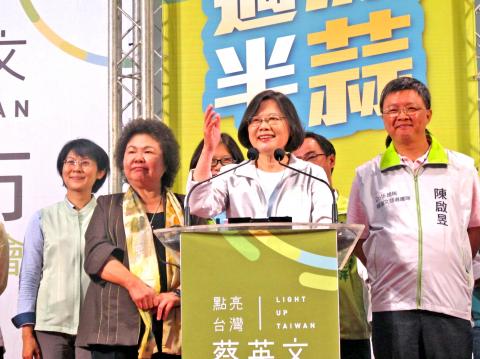Despite the nation’s serious political partisanship, Democratic Progressive Party (DPP) presidential candidate Tsai Ing-wen (蔡英文) yesterday said that a consensus over President Ma Ying-jeou’s (馬英九) ineptitude has formed between the pan-green and pan-blue camps while announcing her five reform proposals.
“Negative sentiment on Ma’s governance has become a consensus between the pan-blue and pan-green camps, as even Chinese Nationalist Party [KMT] presidential candidate Hung Hsiu-chu (洪秀柱) has said publicly that his administration’s performance has been disagreeable, triggering complaints from the public,” Tsai said at a campaign rally in Kaohsiung.
“That an incumbent president should be described in such a fashion by his own party’s presidential candidate is pitiful,” Tsai added.

Photo: CNA
Tsai said now is the time for the entire nation to stand united, as Ma’s government has failed to solve a number of challenges facing the nation, including an aging population, the design of a 12-year compulsory education plan and low starting salaries for college graduates; instead, it has created more problems.
“While my opponents are trying to rally their parties, I am trying to rally the entire nation,” Tsai said. “There will certainly be pain in the process of reform, but giving up on reforms because of fear of pain shows poor leadership.”
“I will win people’s hearts with reform, even if that means upsetting vested interests, because I should be responsible for the nation’s future, not for those of vested interests,” she said.
Tsai received a warm welcome from a cheering crowd of more than 1,500 when she appeared at a rally at the International Convention Center Kaohsiung with Kaohsiung Mayor Chen Chu (陳菊), who is Tsai’s campaign manager.
Tsai used the occasion to announce her five reform proposals: restoring justice for the young generation, improving government efficiency, reforming the legislature, pursuing transitional justice and ending social polarization.
“It is especially important, but very hard, to end social polarization. However, that is the responsibility of the nation’s leader,” Tsai said. “I promise that, even if the DPP wins a majority in the legislature, we will not ‘take the entire bowl.’ We will form an alliance with progressive forces to attract more people into the reform movement.”
Chen said that what people in Kaohsiung most complain about is the unbalanced development between north and south, adding: “We have to speak with our votes next year to not only get Tsai elected, but also secure a DPP majority in the legislature.”

CHAOS: Iranians took to the streets playing celebratory music after reports of Khamenei’s death on Saturday, while mourners also gathered in Tehran yesterday Iranian Supreme Leader Ayatollah Ali Khamenei was killed in a major attack on Iran launched by Israel and the US, throwing the future of the Islamic republic into doubt and raising the risk of regional instability. Iranian state television and the state-run IRNA news agency announced the 86-year-old’s death early yesterday. US President Donald Trump said it gave Iranians their “greatest chance” to “take back” their country. The announcements came after a joint US and Israeli aerial bombardment that targeted Iranian military and governmental sites. Trump said the “heavy and pinpoint bombing” would continue through the week or as long

TRUST: The KMT said it respected the US’ timing and considerations, and hoped it would continue to honor its commitments to helping Taiwan bolster its defenses and deterrence US President Donald Trump is delaying a multibillion-dollar arms sale to Taiwan to ensure his visit to Beijing is successful, a New York Times report said. The weapons sales package has stalled in the US Department of State, the report said, citing US officials it did not identify. The White House has told agencies not to push forward ahead of Trump’s meeting with Chinese President Xi Jinping (習近平), it said. The two last month held a phone call to discuss trade and geopolitical flashpoints ahead of the summit. Xi raised the Taiwan issue and urged the US to handle arms sales to

State-run CPC Corp, Taiwan (CPC, 台灣中油) yesterday said that it had confirmed on Saturday night with its liquefied natural gas (LNG) and crude oil suppliers that shipments are proceeding as scheduled and that domestic supplies remain unaffected. The CPC yesterday announced the gasoline and diesel prices will rise by NT$0.2 and NT$0.4 per liter, respectively, starting Monday, citing Middle East tensions and blizzards in the eastern United States. CPC also iterated it has been reducing the proportion of crude oil imports from the Middle East and diversifying its supply sources in the past few years in response to geopolitical risks, expanding

Pro-democracy media tycoon Jimmy Lai’s (黎智英) fraud conviction and prison sentence were yesterday overturned by a Hong Kong court, in a surprise legal decision that comes soon after Lai was jailed for 20 years on a separate national security charge. Judges Jeremy Poon (潘兆初), Anthea Pang (彭寶琴) and Derek Pang (彭偉昌) said in the judgement that they allowed the appeal from Lai, and another defendant in the case, to proceed, as a lower court judge had “erred.” “The Court of Appeal gave them leave to appeal against their conviction, allowed their appeals, quashed the convictions and set aside the sentences,” the judges